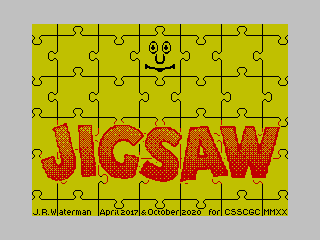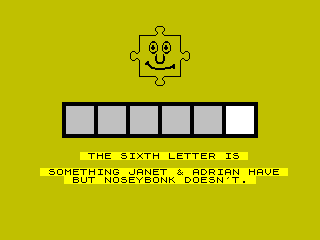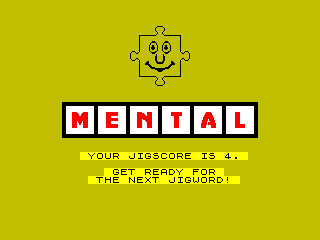Jim Waterman sends us his 6th CSSCGC entry, and just like last time, it’s an adaptation of a BBC children’s TV programme. This time, however, you’re not identifying presenters; instead, you’re solving cryptic clues under the watch of an unsettling anthropomorphic puzzle piece.
As always with a Waterman wonder, comprehensive documentation is provided, detailing the inspiration behind the game, the instructions, and a development log. I really recommend you give it a good read.
 Now we come to loading the tape, and the more astute among you will notice that this program uses all four header types (Program, Bytes, Number array and Character array), a feat matched by not many other titles, apart from Super Mario Fruit Machine, Jim’s entry for the 2004 competition. After that’s all done, we get the title theme, which is a transcription of the original Jigsaw tune for the AY chip. This isn’t skippable, but I guess if you were watching it live, then you’d have to sit through it as well, though you wouldn’t have to put up with 5 minutes and 43 seconds of a banshee’s death cry beforehand either.
Now we come to loading the tape, and the more astute among you will notice that this program uses all four header types (Program, Bytes, Number array and Character array), a feat matched by not many other titles, apart from Super Mario Fruit Machine, Jim’s entry for the 2004 competition. After that’s all done, we get the title theme, which is a transcription of the original Jigsaw tune for the AY chip. This isn’t skippable, but I guess if you were watching it live, then you’d have to sit through it as well, though you wouldn’t have to put up with 5 minutes and 43 seconds of a banshee’s death cry beforehand either.
Let's talk about the game itself, now. You have 20 Jigwords to solve, with each being six letters long. At the start of each round, the clue for each letter is read out by Jigg. Then, you have the chance to input your answer. If you’re correct, Jigg will give you a wry smile and move on to the next Jigword. If you’re wrong, however, Jigg will frown and show you what you should’ve put instead.
 Jigg has a memory of 1000 words, some of which have been scraped from episodes of Jigsaw circulating the web. Incredibly, Jim has even managed to add some puzzles that he remembers seeing during its original broadcast. The other 900-odd phrases have been lifted from an online dictionary.
Jigg has a memory of 1000 words, some of which have been scraped from episodes of Jigsaw circulating the web. Incredibly, Jim has even managed to add some puzzles that he remembers seeing during its original broadcast. The other 900-odd phrases have been lifted from an online dictionary.
I’m pretty rubbish when it comes to general knowledge, so I tend to get half of the clues. Filling in the rest then becomes a crossword without the hints. Eventually though, the clues will start to repeat (especially for the less common letters, as these are assigned less clues), so you’ll eventually recognise more clues. Jim’s science background shows through in some of the hints he provides, such as “the S.I. unit for magnetic flux density” (the Tesla, if you're wondering).
 Like all of Jim’s games, the presentation is top-notch: the graphics are excellent, especially the custom font for the Jigwords, and the sound is also good. The downside to all these bells and whistles is that, being written in BASIC, it drags its feet from round to round. Eventually, the slow pace started to grate against me, so I had to set the emulator to 2x speed. One can only withstand the stare of Jigg for so long before it wears through to the core of their soul.
Like all of Jim’s games, the presentation is top-notch: the graphics are excellent, especially the custom font for the Jigwords, and the sound is also good. The downside to all these bells and whistles is that, being written in BASIC, it drags its feet from round to round. Eventually, the slow pace started to grate against me, so I had to set the emulator to 2x speed. One can only withstand the stare of Jigg for so long before it wears through to the core of their soul.
Finally, you get to the end of the selection. I won’t ruin the ending for you, but I will tell you, you do not want to lose…
So, to conclude, Jigsaw is a nicely presented but terribly slow game which captures the spirit of the puzzles quite well. With the speed that it runs at, you could probably fill the half-hour TV slot just playing a session of this! If only Jim had written a BBC Micro version of this back in the 1980s; he could’ve made a small fortune selling it to Acornsoft!
Scores
| Graphics |
Sound |
Gameplay |
Innovation |
TOTAL |
| 62% |
63% |
32% |
20% |
44% |
 Now we come to loading the tape, and the more astute among you will notice that this program uses all four header types (Program, Bytes, Number array and Character array), a feat matched by not many other titles, apart from Super Mario Fruit Machine, Jim’s entry for the 2004 competition. After that’s all done, we get the title theme, which is a transcription of the original Jigsaw tune for the AY chip. This isn’t skippable, but I guess if you were watching it live, then you’d have to sit through it as well, though you wouldn’t have to put up with 5 minutes and 43 seconds of a banshee’s death cry beforehand either.
Now we come to loading the tape, and the more astute among you will notice that this program uses all four header types (Program, Bytes, Number array and Character array), a feat matched by not many other titles, apart from Super Mario Fruit Machine, Jim’s entry for the 2004 competition. After that’s all done, we get the title theme, which is a transcription of the original Jigsaw tune for the AY chip. This isn’t skippable, but I guess if you were watching it live, then you’d have to sit through it as well, though you wouldn’t have to put up with 5 minutes and 43 seconds of a banshee’s death cry beforehand either.
 Jigg has a memory of 1000 words, some of which have been scraped from episodes of Jigsaw circulating the web. Incredibly, Jim has even managed to add some puzzles that he remembers seeing during its original broadcast. The other 900-odd phrases have been lifted from an online dictionary.
Jigg has a memory of 1000 words, some of which have been scraped from episodes of Jigsaw circulating the web. Incredibly, Jim has even managed to add some puzzles that he remembers seeing during its original broadcast. The other 900-odd phrases have been lifted from an online dictionary.
 Like all of Jim’s games, the presentation is top-notch: the graphics are excellent, especially the custom font for the Jigwords, and the sound is also good. The downside to all these bells and whistles is that, being written in BASIC, it drags its feet from round to round. Eventually, the slow pace started to grate against me, so I had to set the emulator to 2x speed. One can only withstand the stare of Jigg for so long before it wears through to the core of their soul.
Like all of Jim’s games, the presentation is top-notch: the graphics are excellent, especially the custom font for the Jigwords, and the sound is also good. The downside to all these bells and whistles is that, being written in BASIC, it drags its feet from round to round. Eventually, the slow pace started to grate against me, so I had to set the emulator to 2x speed. One can only withstand the stare of Jigg for so long before it wears through to the core of their soul.
